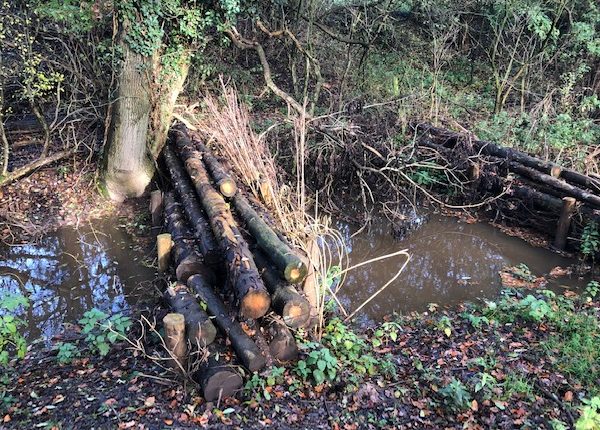Farmer Facilitation
Groups & WEIF Project
ELM Associates facilitate two farmer facilitation groups to help groups of farmers and land managers work together to improve the natural environment at a landscape scale.
Lower Dane & Tributaries
In conjunction with The Mersey Forest, Rachel facilitates a group in the Lower Dane catchment stretching from Sandbach Flashes, along the Dane corridor, up to Northwich. The group currently has 26 members and focuses on flood risk management, woodland creation and management, water quality improvement, farmland birds and pollinators.
Recent activity has included the installation of Leaky Debris Dams on various farms within the group, new woodland planting, and participation in the GWCT Great Farmland Brid Count. Along with free farmer training days on Countryside Stewardship, Soil Management, NVZ’s and Farming Rules for Water and Farm Diversification.
Woody Debris Dams installed on farms within the Lower Dane Facilitation Funded Group. These ‘leaky dams’ help to slow overland flow through valley woodlands at times of high rainfall helping to reduce the downstream flooding risk and improve water quality by trapping phosphate leaden sediment.
Sandstone Ridge Farmer Network
Working alongside the Sandstone Ridge Trust Nicky facilitates a group of 40 farmers stretching from Malpas up to Tattenhall. The group focuses on improving biodiversity and habitats and protecting historic environments along the ridge whilst maximising the marketing and tourism opportunities.
Led by farmer priorities the group have taken part in various workshops and training days including: bat walks, grassland management, soil husbandry, farm silvopasture and farm business grant opportunities.
If you farm in these areas and would be interested in becoming a member of the group please do not hesitate to get in touch.
Catchment Partnerships
Farming Connect
Farming in Wales? Jane is registered to provide tailored advice under the Farming Connect Programme through Agri Plan. Considering your grassland and crop regimes, addressing soil and nutrient management and managing farmyard manure is becoming essential.
Such advice will help you make best use of your resources, reduce outputs and address all the above issues, as well as providing you with Nitrate Vulnerable Zone (NVZ) advice and identifying any potential environmental risks
1-2-1 advice is 80% funded, group advice can be 100% funded (all advice is funded up to 1,500 euros per instance of advice).


